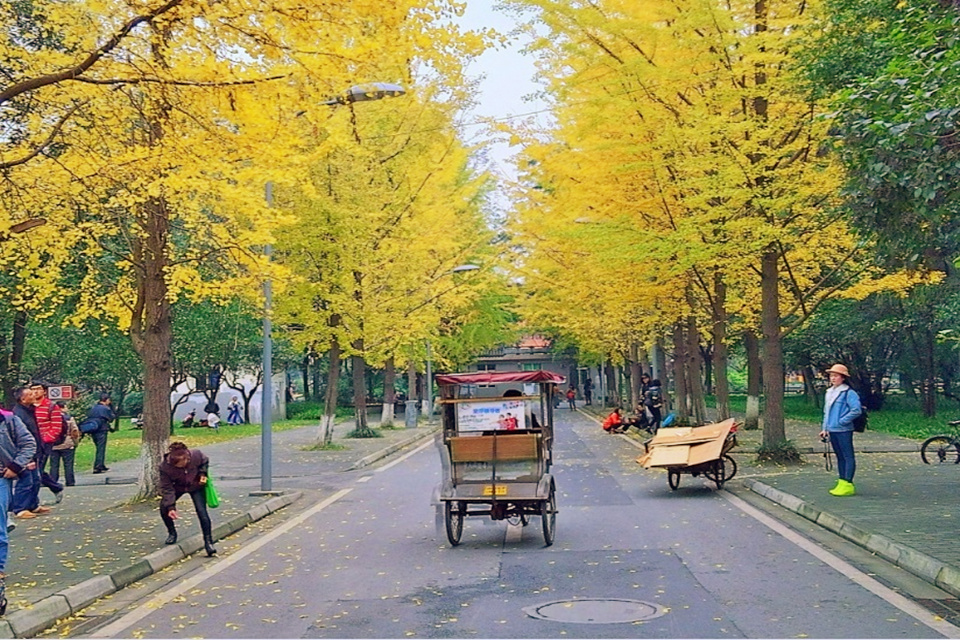China Travel: 10 Trials and Tribulations of Trying to Learn Chinese
Love 'em or hate 'em, trials and tribulations are all part of the Chinese language learning journey. From greetings and Chinese names to Chinese food menus and check-in desks, here are 10 ways to use your Mandarin skills during your China travels!

Love 'em or hate 'em, trials and tribulations are all part of the Chinese language learning journey.
Here are 10 sticky situations you may find yourself in during your China travels and how to get out of them!
Spent hours practicing online with your Chinese language coach, or camping out binge-watching Chinese TV shows in your front room? That will certainly help to prepare you for the many Mandarin conversations to come in China. However, your time learning Chinese will most likely not be blunder-free.
Backpack, sunglasses and your Speechling Audio Dictionary at the ready, you touch down in China with butterflies in your stomach and a smile on your face. The first trip to a Chinese speaking country can be a daunting experience, but also an exciting one. Finally, the chance to try out some Mandarin on the streets!
The beginning of your new life and travels in China will probably not start in the country itself, but 30,000 feet high in the sky on your first flight there. Slowly tune-in to the gentle humdrum of other passengers speaking Chinese.
Noodles for in-flight breakfast? Why not! Eavesdropping on fellow passengers’ Mandarin conversations while you pretend to sleep? Ideal!
Listening to so many people on the plane talking Chinese at once can be where the excitement first begins and the realisation starts to sink in – these people all around you are not just your fellow passengers, they are also all your potential new (and free!) Chinese language teachers.
Every native Chinese language speaker you meet on your travels will help to improve your Mandarin, whether you realise it or not. Learning Chinese, however, is not always as straight-forward a task as it seems from the other side of your textbook. It is a rocky road and a journey in itself where you may encounter many an obstacle or embarrassment along the way.
From greetings and Chinese names to Chinese food menus and check-in desks; these are just a handful of the trials and tribulations you may experience when travelling through China learning Mandarin...
 姐姐,你好!
姐姐,你好!
1. Excuse me!
Family has been one of the cornerstones of Chinese culture since ancient times and in China, even strangers are regarded as members of your extended family.
That girl selling fruit? Your sister! That man at the pharmacy? Obviously your uncle! In short, the world is your family. So while calling an older lady grandma could get you a slap in the face in an English speaking country, the term is actually considered polite in China.
A well-mannered way of getting a stranger’s attention in China is not by saying excuse me as we would in English. Instead, it is better to refer to people as if they are a family member. However, remember that this Chinese alternative to excuse me is determined by a person's age in relation to yours and requires careful consideration prior to getting their attention. Referring to your newfound sister as grandma could land you in a sticky spot or two!
 Taking a taxi in China is no easy feat
Taking a taxi in China is no easy feat
2. Uber Taxi App not Working
Struggling to use your Uber taxi app in the airport car park? China's answer to Uber is the infamous DiDi taxi. However, if you have not yet worked out how to decipher the mirage of Chinese characters on the app yet, you would be better off hailing a standard taxi.
Guard a hard copy of the directions to your hotel or university with your life though, or you may live to regret it.
In the first few days, be careful to always travel with that trusty peice of paper on which your new address is written in Chinese. You may think that your taxi driver understood you as you muttered the directions and hopped in the cab, but you run the risk of ending up in a completely unknown destination.
Chinese taxi drivers are very chatty and can get carried away debating about the news, life in your country, or whatever else their heart desires before double checking that you are actually heading in the right direction.
 'What you cannot avoid, welcome.' - Chinese Proverb
'What you cannot avoid, welcome.' - Chinese Proverb
3. Greetings in China
Learning to understand when somebody is simply greeting you and not actually asking a proper question is something best learnt early on to avoid any red-faced encounters.
When asked 你吃了吗? (Nǐchīle ma? - Have you eaten?) or told 你回来了! (Nǐ huílái le! - You’re back!), it is best not to proceed by reeling off the entire contents of your stomach or explaining where you have just come from as this is actually simply an informal greeting.
Once you have got the knack of deciphering greetings, you can begin mastering how to start a conversation in Mandarin.
 Chinese names inspired by the seasons
Chinese names inspired by the seasons
4. Chinese Names
One of the unspoken rituals of learning Mandarin in China is choosing a Chinese name. If your Mandarin teacher has not already given you a Chinese name, select yours wisely before shouting it from the rooftops. Bear in mind that it is rather difficult to change your name once people have become accustomed to it.
I made the mistake of using the name of 小燕子 (Xiǎo Yànzi - Little Swallow) after seeing it on the television in my hotel room. As it turns out, 小燕子 is somewhat of a humourous character on a well-known Chinese soap opera called 还珠格格 Huán zhū gégé (My Fair Princess). Without fail, each new revelation of my Chinese name would instantly insight raucous laughter from any nearby listeners!
 Staycation in Chengdu, anyone?
Staycation in Chengdu, anyone?
5. Check-in Challenges
Hotel or dormitory check-in time can be one of the very first Chinese language hurdles to overcome during your travels as many of the 阿姨 (Āyí - Aunties) or 叔叔 (Shūshu - Uncles) at the check-in desk, although very friendly, may not have a strong grasp of English.
Learning some essential Mandarin hotel vocabulary in advance could save you some check-in struggles later on. Words, such as 押金 (Yājīn - Deposit), 钥匙 (Yàoshi - Key), 刷卡 (Shuākǎ - Swipe your card) and the all-important, 包含早餐 (Bāohán Zǎocān - Breakfast included) may help to avoid hours talking at cross-purposes in Mandarin whilst jet-lagged.
Your Mandarin will seem much better in the morning once you have had a good night's sleep and time to mentally prepare for the challenge of trying to learn Chinese day in, day out.
 'If Language is not correct, then what is said is not what is meant. If what is said is not what is meant, then what ought to be done, remains undone.' - Confucius
'If Language is not correct, then what is said is not what is meant. If what is said is not what is meant, then what ought to be done, remains undone.' - Confucius
6. Grappling with Dialect
Think you have just about mastered basic Mandarin? China has hundreds of individual dialects and Mandarin is only one of them. Trying to learn a new local Chinese accent and dialect can therefore seem like somewhat of an arduous task.
Although it may be frustrating initially, you will actually come to understand most accents and some dialects simply by being exposed to them and without much effort at all. The key is to persevere and practice, whether it be going to the market more frequently or making more of an effort to listen to taxi drivers.
Learning local dialects can be a useful skill when bargaining, but to avoid letting local accents affect your standard Mandarin, you can make sure you are not led astray by certain pronunciations.
 Don't put your foot in it!
Don't put your foot in it!
7. Effective Communication
You have just been congratulated by your teacher or language coach on some particularly tricky Chinese phrases that you have just learnt and are feeling on top of the world. Only five minutes later you try to order a pizza in your best Chinese accent and your world comes crashing down - I don't understand English comes the deafening reply.
“我不会英语” (Wǒ bù huì yīngyǔ)
I cannot speak English
or
“听不懂,听不懂” (Tīng bù dǒng, tīng bù dǒng)
I don't understand, I don't understand
It seems like no matter how long you have been learning Mandarin, there will always be someone out there who is not able to understand you. Just put it down to differences in local accents and try not to get too disheartened. The most important part of learning and communicating in Mandarin is feeling confident enough to practice with native Chinese speakers.
 Learning to Listen
Learning to Listen
8. Learning Chinese Aurally
Misunderstandings due to poor aural Mandarin skills are arguably one of the biggest tribulations of learning Chinese.
One of the most common fall-backs in situations where your aural Mandarin skills have been stretched to the limit is the trusty old smile and nod.
This technique may help to improve your Mandarin listening skills over time, but be warned, it comes at a price! Not knowing what is going on or what you have unknowingly agreed to can lead to some scary situations.
My Mandarin learning in China begun with conversations with my language partner, Tingting. A mum of one with a heavy Hunan accent (probably quite similar to that of Chairman Mao, as it happens), our conversations consisted of smatterings of English and Chinese fused together.
On one occasion when I had to use the smile and nod technique I was led down several strange alleyways in the Chinese town of Yangshuo before I finally clocked what was happening. My language partner was taking us to get our portraits painted so we could have our faces printed onto t-shirts as a keepsake!
Definitely a stretch for my Mandarin at the time, but one of the weird and wonderful rewards of learning Mandarin in China!
 Tasty Chinese food
Tasty Chinese food
9. Chinese Food Menus
There are no two ways about it – Chinese food menus are a minefield! Unless you are lucky enough to stumble upon a menu with pictures in it, ordering your first meal in China will probably be a bit of a lucky draw. China has one of the most diverse cuisines in the world. Speciality dishes vary between provinces and even between towns and cities.
Sixi roasted husband? Health demolition tofu recipe? Even menus with English translations can leave you none the wiser as to what you just ordered.
If, like me, you have special dietary requirements, it is best to simply learn some essential Mandarin food related phrases on which to get by and let the waiting staff do the ordering for you.
“要素的,不要辣的” (Yàosù de, bùyào là de)
I would like vegetarian; not spicy
The above were my relentless ordering demands in the notorious meat-filled chili pepper-lined kitchens of Sichuan. They always seemed to be a cause of much hilarity for local restaurant staff.
 Sichuanese Rickshaw Rides!
Sichuanese Rickshaw Rides!
10. Public Transport
Most travellers in China will find themselves lost and in need of a bus, tube or train at some point or another during their travels. While train seats can be reserved, like most other places, bus and tube seats cannot.
Knowing to give up your seat for elderly or disabled people is a very hot topic in China and was even the basis of a well-known film, 搜索 (Sōusuǒ Caught in the Web).
In some places in China it is even considered polite to give your seat up to women and children. A nifty way to avoid making a faux-pas is to learn the Mandarin phrase, 让座 (Ràngzuò - To give up your seat), so you at least know when you are being asked to move before it is too late!